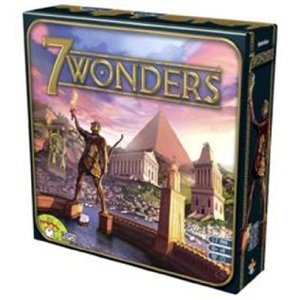 7 Wonders Hits Shelves Just in Time for the Holidays
7 Wonders Hits Shelves Just in Time for the Holidays

Card drafting. Civilization Building. Resource Management. Trading. Simple warfare. Direct Player Interaction. All these things are in 7 Wonders [Amazon, Funagain] and they come together marvelously. What else could ask for? How about easy to learn rules, fast concurrent gameplay, excellent artwork, replayability, and a short game: 30-45 minutes. You'll be cheering for round two when the game wraps up instead of looking to head home for the 11:00 clock news.
Not only is 7 Wonders in contention for 2010 game of the year in many circles, it also supports up to 7 players. In a day and age where everything is 4 players, 7 Wonders is a godsend.
For more information checkout Drakkenstrike's 7 Wonders Component Breakdown in HD. And, as always, here's the company's line:
"7 Wonders lasts three ages. In each age, players receive seven cards from a particular deck, choose one of those cards, then pass the remainder to an adjacent player, as in Fairy Tale or a Magic: the Gathering booster draft. Players reveal their cards simultaneously, paying resources if needed or collecting resources or interacting with other players in various ways. (Players have individual boards with special powers on which to organize their cards, and the boards are double-sided as in Bauza's Ghost Stories.) Each player then chooses another card from the deck they were passed, and the process repeats until players have six cards in play from that age. After three ages, the game ends.
In essence 7 Wonders is a card development game along the lines of Race for the Galaxy or Dominion. Some cards have immediate effects, while others provide bonuses or upgrades later in the game. Some cards provide discounts on future purchases. Some provide military strength to overpower your neighbors and others give nothing but victory points. Unlike Magic or Fairy Tale, however, each card is played immediately after being drafted, so you'll know which cards your neighbor is receiving and how his choices might affect what you've already built up. Cards are passed left-right-left over the three ages, so you need to keep an eye on the neighbors in both directions."
http://www.youtube.com/watch?v=Cjv1JfFeQko&hd;=1
Read More in: Board Games | Gaming News
Share this Article with others: 
Related Articles:
Came straight to this page? Visit Critical Gamers for all the latest news.
Posted by Critical Gamers Staff at December 9, 2010 4:55 PM
